If you had asked Mea Motu 10 years ago if the boxing ring would become her safe place, she would have laughed and thought, “What a joke!”
At the time, in the grips of domestic violence and feeling trapped, she associated the sport with her then-husband. Dodging jabs from him was a weekly occurrence.
“I hated boxing,” tells the single mother-of-five. “My ex did it, so that made me bitter towards it. There was always a shadow of him associated with it. I was like, ‘Boxing isn’t for me, it’s for him.'”
So no one is more surprised than Mea that becoming a professional boxer has brought her healing. It’s redeemed all the things that were stripped from her – self-confidence, freedom and mana.
In April, the 33-year-old made history as the newly crowned IBO world super bantamweight champion, after defeating Canada’s Tania Walters at Fight for Life.
As the unanimous decision was announced, Mea dropped to her knees and cried.
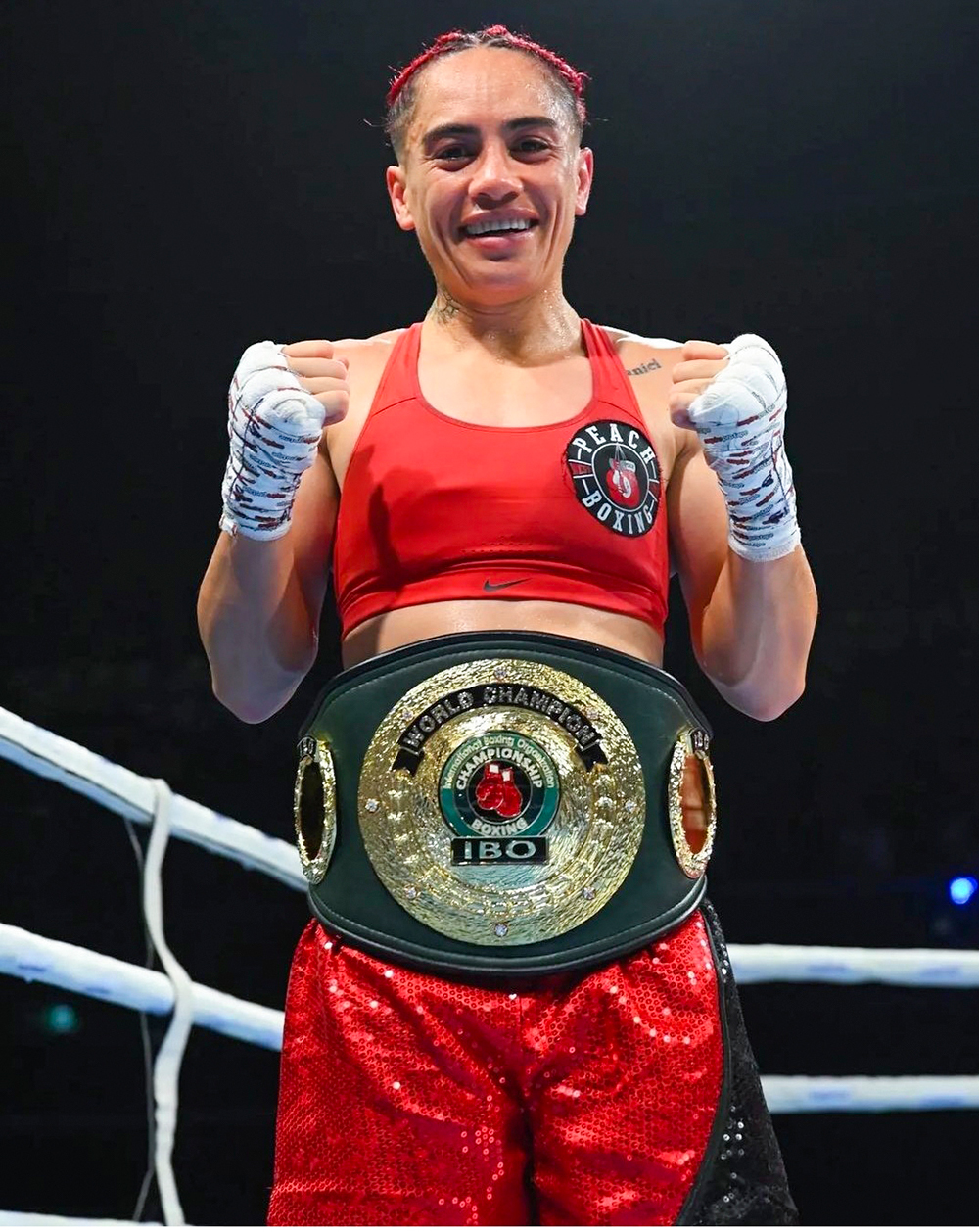
“I started getting emotional before the result was even announced because I was just so proud of myself that I finished it,” she says. “That felt like a big accomplishment. Everything I had worked so hard for hit me really good.
“It was like a brick dropped on my heart. My legs gave way. I couldn’t have cared less what the decision was because I already felt like a champion. This journey has brought up a lot of cobwebs for me… trauma but also peace.”
Several days later, when the Weekly visits her West Auckland home, Mea is still beaming. Not just from all the attention and support (“I’ve had messages from men in their seventies saying how courageous I am, even though they’re against boxing”), but from the number of “firsts” she has experienced lately.
The day before – hiding under a hoodie so people wouldn’t recognise her bright red hair – she and her sister visited Kmart to buy kitchen accessories.
“I’ve never bought things before that are actually brand new,” she says with a grin. “Everything’s always been either given to me or bought second-hand. So that was massive for me. We had two trolleys. I was just about crying!
“After 33 years, I’m just learning how to have a bank account, my own phone, how to pay bills. Even ‘What do I do with money?’ When you’re in an abusive relationship, the abuser does everything possible to make sure you can’t live without them.
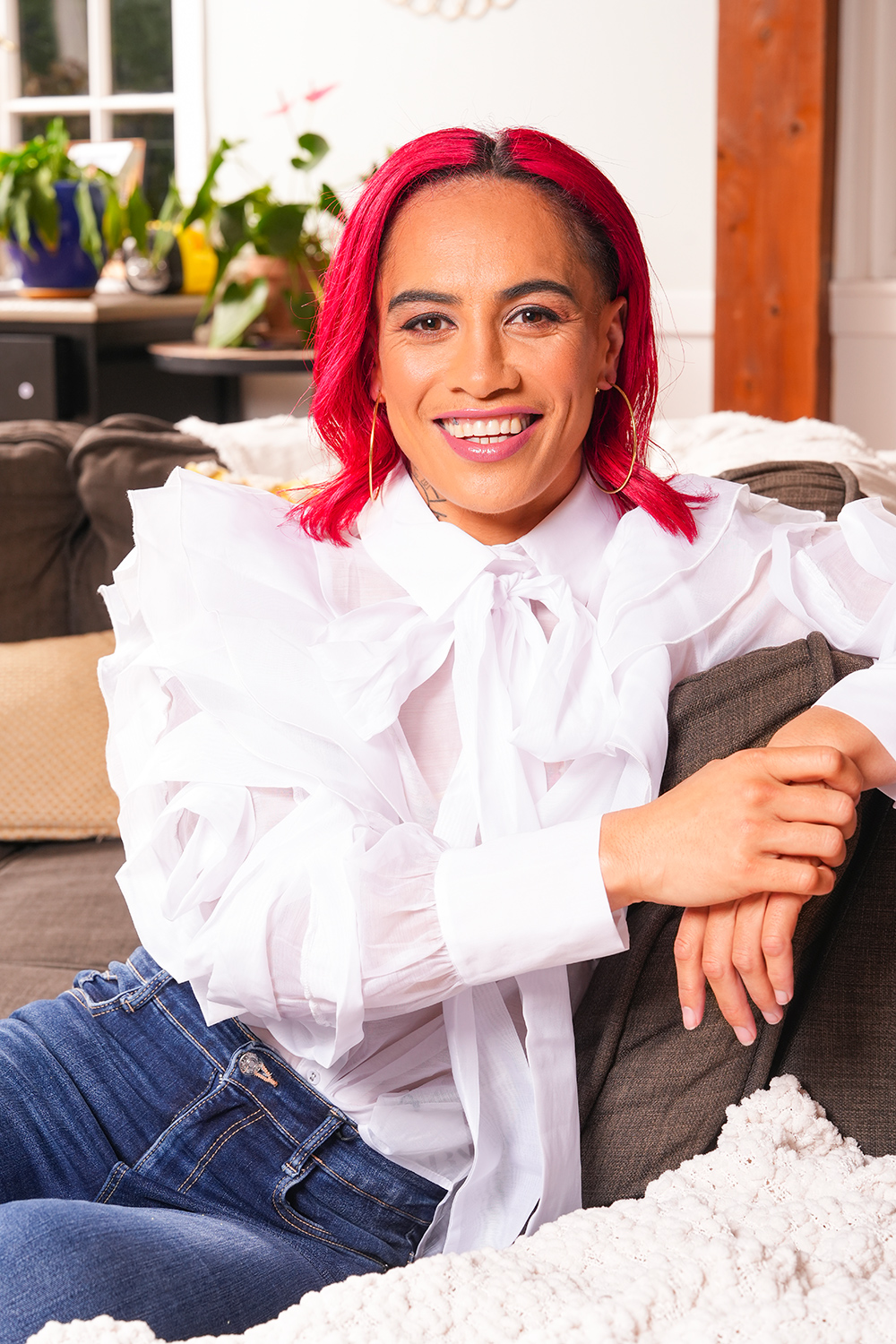
“During the marriage, I never paid a bill. I didn’t control any money, even when I had a job. I’ve always been controlled. You don’t know how to live a normal life, so that’s why I stayed. It’s easier said than done to just walk away.”
Growing up in a “beautiful, loving” family in the small Northland town of Pukepoto, Mea, who is of Te Rarawa descent, didn’t know anyone who boxed.
The self-described tomboy played soccer and touch rugby, while enjoying a carefree rural childhood of riding horses, milking cows and running around barefoot.
“I went to the marae a lot, and saw all my elders and grandparents,” she recalls.
“I always remember the joy and laughter they gave me. I held that as a dream I wanted for my own children.”
When Mea was 10, the family moved to Auckland. She discovered boxing several years later, when she followed her mum to a gym class.
“I was playing soccer for Auckland reps and I needed to get fitter. It was six months of hard boxing training and I started loving it. One day, they said, ‘Jump in the ring and do some sparring with the boys.’ I was 14 and they were 16. So, I’m boxing with them and then I noticed they were crying. I thought, ‘Wow, I’m actually good at this.'”
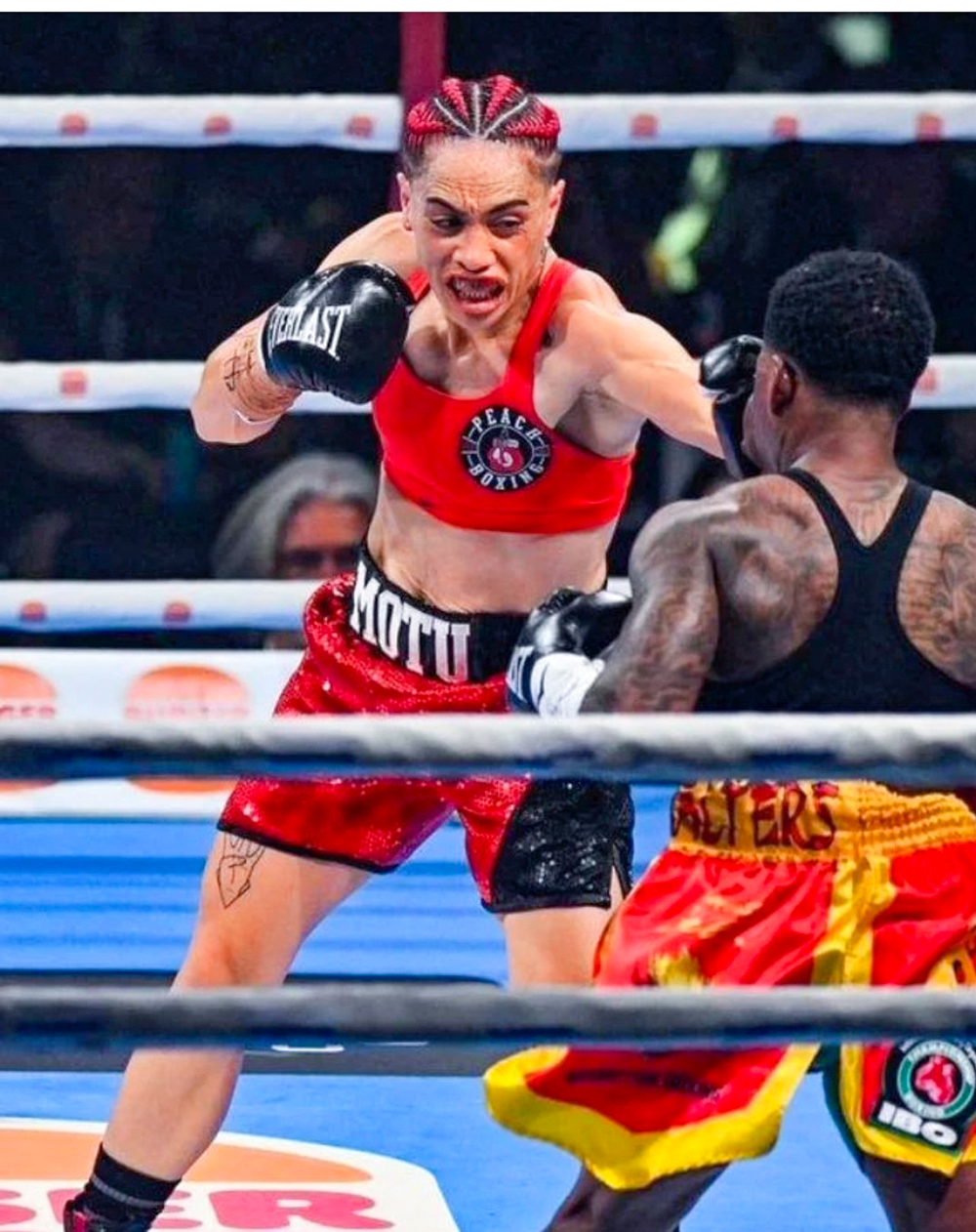
Mea met her first boyfriend and future husband while she was at Auckland Girls’ Grammar School. It was a whirlwind romance.
“I was like, ‘Okay, so this is how you fall in love.’ When I got pregnant to him, due to my faith-filled upbringing, I thought I was doing the right thing getting married at 17. But at the same time, I didn’t want to do it.
“The marriage was really good until I had my second child. It started as mental abuse before it became violent. He’d do the odd whack and I’d think, ‘Is that normal?’ because I’d never seen my dad lift his hand to my mum. He told me if I ever called the cops, my family’s going to be dead. So I was too scared to say anything. I didn’t want to ruin my siblings or my parents’ lives.
“I wasn’t in love then, I was in hate. If he was on drugs or alcohol, it was like he was two different people.”
When Mea was heavily pregnant with their third child, she recalls getting beaten and then left in the Titirangi bush. She remembers walking home in the rain, bleeding and with a black eye.
“I knew it was wrong and I had to find a way out. By that stage, I had already had a bat, a crowbar and a steel-capped boot to my head. Sometimes I had to be my own hospital.”
At times, she was homeless, living in her car on the run from her abusive husband, and relying on relatives to look after her kids.
A turning point came after another harrowing incident.
“When he was about to stab me, my daughter, who was eight at the time, jumped in front of the knife. Then she ran out to get the neighbours,” recounts Mea.
“She literally saved me that day. After seeing what my daughter had done for me, it changed my life. I thought, ‘If she has the courage to stand up to him and can fight, I can too.’ He got arrested and went to prison.”
But the fear – given her husband’s gang affiliation – and low mental health continued to trail Mea, who admits to previously wanting to give up on life.
“Two years ago, I started saying I needed to do something for me because I was very depressed and still traumatised from the abuse.
“My new partner [the father of her two youngest children] would always try to encourage me too. He said, ‘Why don’t you go back to boxing?’ So I posted on Facebook: ‘Does anybody want to do some training with me?’ I’d just had a baby and I wanted to feel good about myself.
“Then Isaac Peach, who I had met through boxing as a young teen, messaged me. He invited me to come to his gym, which he had set up at his house just down the road from me.

“It took me all day to reply, but I said I would come. And I always stick to my word, even though I regretted saying yes.
“I showed up at his house with my two babies. I was so nervous. Isaac said, ‘Sit down, have a feed’ and asked, ‘What are we going to do with you?’ I replied that doing boxing for fitness would be fun.”
But having previously seen Mea’s skills as an amateur boxer, Isaac knew Mea was capable of more. He turned to wife Alina and said, “She’s going to be the next world champion.”
Mea left their house and wondered what she had got herself into.
“I showed up at the gym the next day and I enjoyed it. Everyone made me feel so comfortable. And even though I don’t trust people, I felt safe.
“Each week got better and better, and I started finding who I was. I stopped associating boxing with my ex and I saw it as an art form. I thought this could actually give me a purpose and be part of my healing journey. And it did. I channelled my anger and made it about me, not him.”
After a few months, she let her walls down, telling Isaac and Alina about surviving domestic abuse.
“They told me, ‘We’ll protect you and you’re never going to go through that again. We’re going to teach you to enjoy life and how to live properly.'”
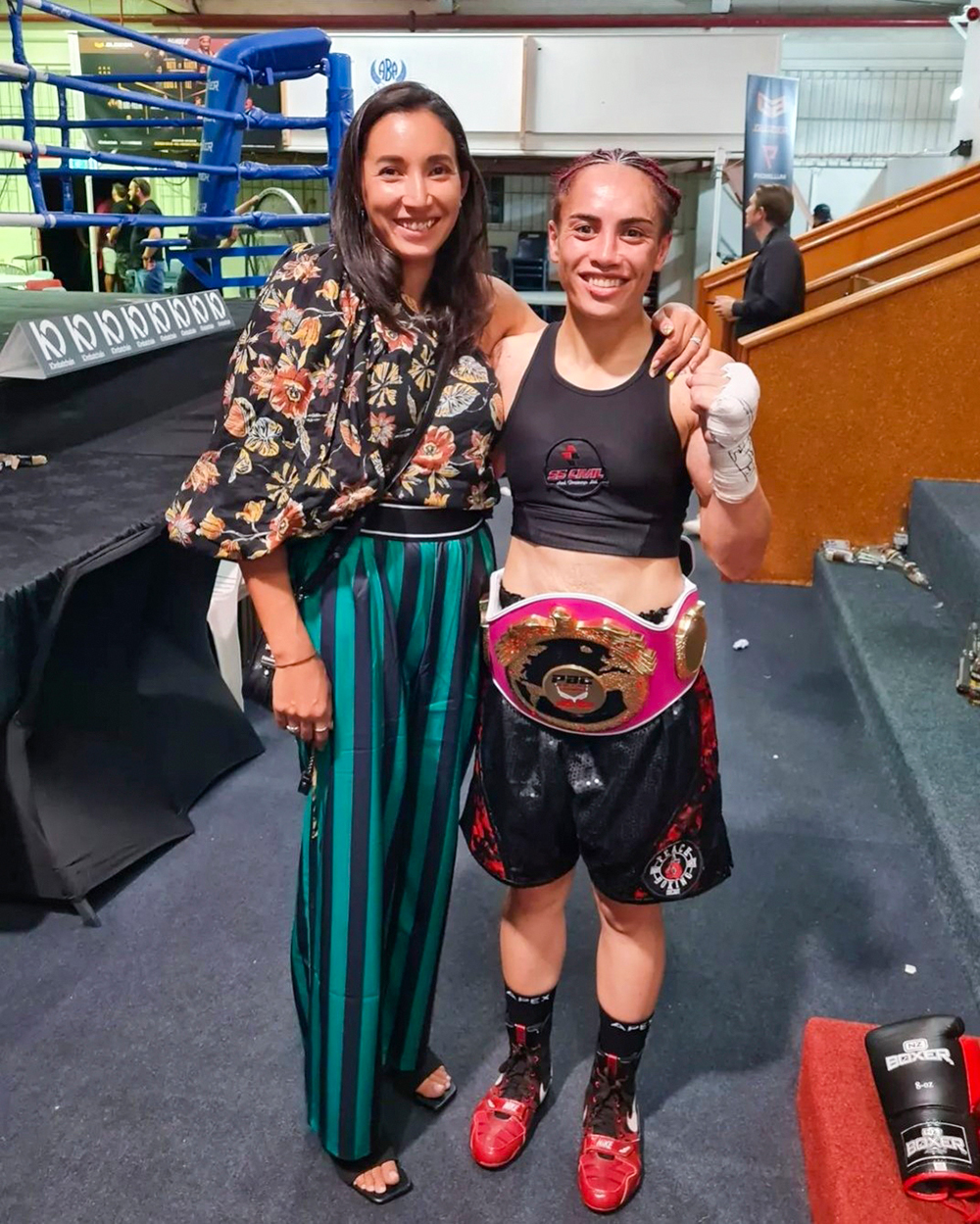
Rediscovering her teenage love of boxing, to step into the ring as a pro fighter, has taken sacrifice, support and overcoming self-loathing.
She trains six times a week with regular 4.30am starts and somehow juggles a job with five kids. Mea also had to grow trust with her male teammates. It’s taken a full year to truly believe their words of encouragement.
“I hated men,” she tells. “But seeing the way they treated me changed that. And I started to believe it when they told me at least once a week how proud they were of me and how beautiful I was, inside and out.
“Before then, I saw no value in me. I couldn’t stand looking in the mirror, but if I did, I’d go ‘Ew!'”
Mea also came to the realisation – after years of being scared to be alone – that she was happiest in her own company. She separated amicably from her partner and they remain friends who co-parent all five children, David, 16, Lani, 14, Tutanekai, nine, Shae, four, and Daniele, three.
“My kids [three eldest] still have a relationship with their dad. He rings from jail to talk to them and he loves them. I don’t hate him any more, I just hated his behaviour. I’ve also forgiven him, which was the biggest step of my life.”
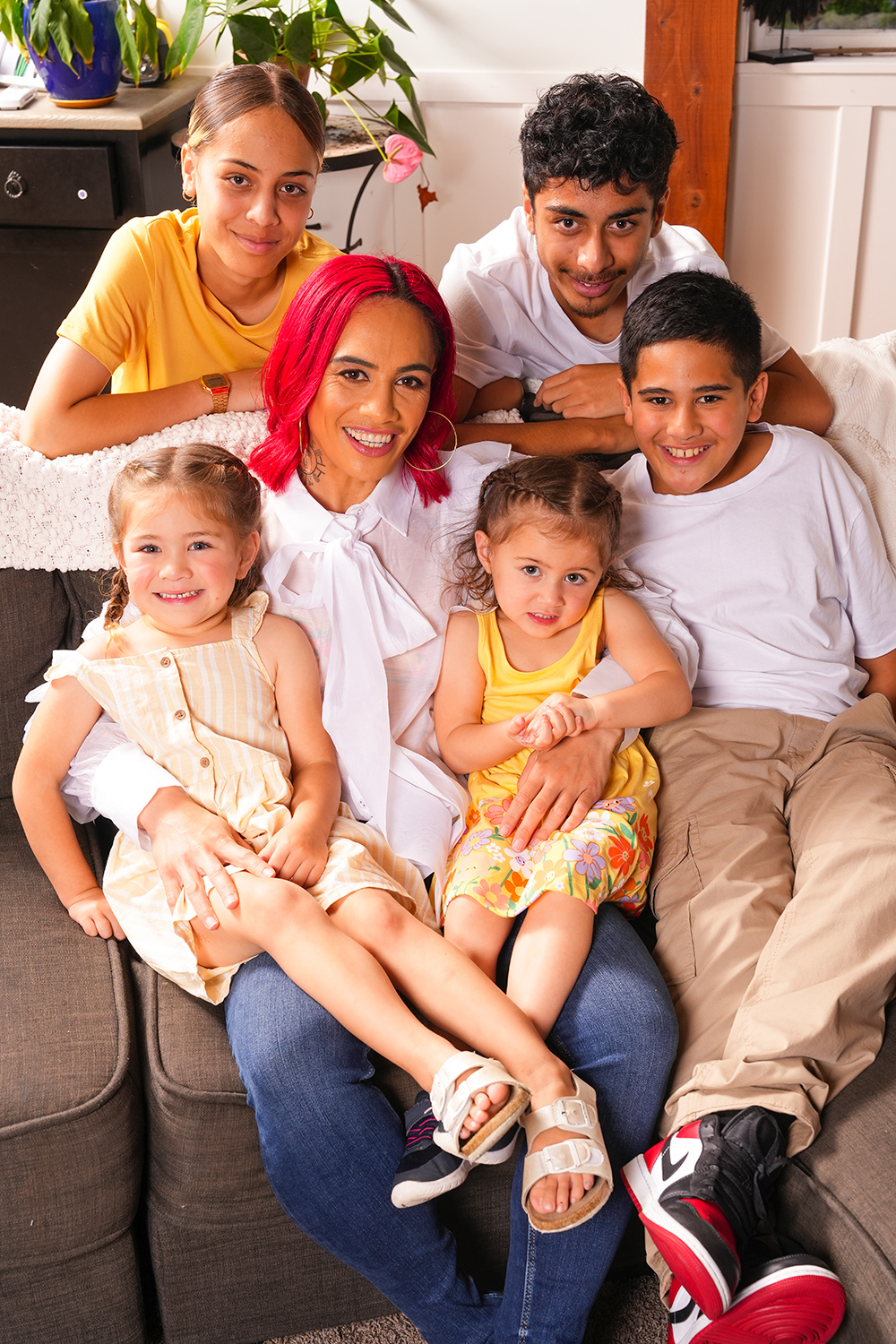
Mea with her gorgeous kids (clockwise from top left) Lani, David, Tutanekai, Daniele and Shae. “We have a very close bond.”
As Mea talks, it becomes evident that her children are her number-one inspiration and she is moving forward with them, lighter and freer. Violence may have broken her spirit, but boxing has pieced her back together.
“My kids have turned me into a great mum,” she grins. “We have a very close bond. The older two are my best friends, we go everywhere together. They’re very caring and loving. I was always scared of how they would turn out after what they’ve been through. Their mental health is the most important thing to me.”
Looking back, Mea concedes it was shame that stopped her from speaking up. Her advice to other women trapped in an abusive relationship is: Don’t stay in the darkness.
“Don’t be ashamed – use your voice and speak up. You will find love for yourself again. I knew if I wanted to stop the cycle and change our lives, I had to change me.
“Now that I’ve come through my struggles, I feel so blessed and grateful to be free. I feel like I’ve won Lotto!”
Help is here
For emergencies, call 111.
Lifeline: 0800 543 354 (0800 LIFELINE) or free text 4357 (HELP).
Are You OK family violence helpline: 0800 456 450. Alcohol & Drug Helpline: 0800 787 797.

With a world title under her belt, unstoppable Mea says, “I feel like I’ve won Lotto!”
Quickfire
Share the best message you’ve received since winning your fight?
One lady contacted me and said, “For the second time, I have left my abuser. You empowered me.”
Tell us your favourite meal?
I’m a vegetarian, so it’s a plant-based Rebel Whopper with cheese from Burger King.
Did you dye your hair red especially for your big fight?
Actually, my brother dyed it for me. He said, “Let me do it from now on.” I’ve always dyed it different bright colours.
What’s next for you?
I want to collect all five of the major world title belts. And I will do it.



